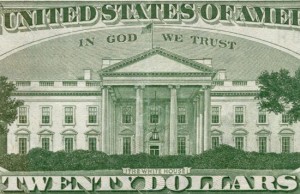 AKRON, Ohio — A federal court has again dismissed an atheist’s effort to have the phrase “In God We Trust” removed from U.S. currency.
AKRON, Ohio — A federal court has again dismissed an atheist’s effort to have the phrase “In God We Trust” removed from U.S. currency.
“Plaintiffs cannot demonstrate that the use of the motto on currency substantially burdens their religious exercise,” Judge Benita Pearson, appointed to the bench by Barack Obama, ruled on Wednesday.
“No reasonable viewer would think a person handling money does so to spread its religious message,” she said. “A person does not own the bills and coins printed by the United States Treasury. The government does not require citizens to display money. Money does not exist for the express purpose that it be observed and read by the public.”
As previously reported, atheist Michael Newdow, who has filed numerous suits challenging the mixture of God and government, first submitted a complaint in the Southern District of New York in March 2013, asserting that the motto violates the Establishment Clause of the United States Constitution as it serves to proselytize unbelievers.
But in September of that year, U.S. District Court Judge Harold Baer, Jr., nominated by Bill Clinton, rejected Newdow’s arguments, opining that “the inclusion of the motto on U.S. currency . . . does not violate the Establishment Clause [of the Constitution].”
He consequently appealed his case to the Second Circuit Court of Appeals in Manhattan, but in May 2014, the court likewise ruled against the prominent atheist.
“The Supreme Court has recognized in a number of its cases that the motto, and its inclusion in the design of U.S. currency, is a ‘reference to our religious heritage,’” it wrote. “We therefore hold, in line with the Supreme Court’s dicta, that [the motto appearing on currency does] not violate the Establishment Clause.”
Newdow soon began seeking plaintiffs to challenge the motto from a different angle—the federal Religious Freedom Restoration Act (RFRA) signed in the 1990s by then-President Bill Clinton. He filed a new suit featuring 43 plaintiffs, with nine of them being children.
“When [the child] is confronted with ‘In G-d We Trust’ on every coin and currency bill she handles or learns about in school, the power and prestige of the federal government is brought to bear upon her with the message that her father’s (and her own) atheism is false,” the complaint read in part.
“Additionally, she is taught to carry and promote a religious message her father is teaching her to at least consider denying, and to also make a completely false declaration as to what is likely to be her own religious view on the matter of G-d’s existence,” it asserted.
But Pearson ruled that there are alternate means for the complainants to make payments if they do not like the national motto on money, and even in situations where that is not possible, the use of currency does not burden their free exercise of religion.
“Credit cards and checks allow Plaintiffs to conduct the bulk of their purchases with currency not inscribed with the motto,” she wrote. “And for cash-only transactions, such as a garage sale or a coin-operated laundromat, the use of the motto on currency does not substantially burden Plaintiffs’ free exercise.”
The American Center for Law and Justice (ACLJ) had filed an amicus brief on behalf of 50 members of Congress, who urged the court to dismiss the suit. Participants included Reps. Joe Pitts of Pennsylvania, Tim Huelskamp of Kansas, John Fleming of Louisiana, Trent Franks of Arizona, Doug Lamborn of Colorado, Daniel Webster of Florida, Dan Newhouse of Washington and Robert Latta of Ohio.
“The national motto simply echoes the principle found in the Declaration of Independence that our freedoms come from God and not the state,” it read. “Plaintiffs ask this court to do exactly what the Supreme Court warned against in Zorach—prefer atheism over religion even to the extent of censoring the historical fact that the United States was founded upon a belief in God.”
As previously reported, the motto “In God We Trust” has appeared on U.S. coins since 1864 and began being printed on paper currency in 1957. The phrase is to believed to have originated with the Star Spangled Banner, written during the War of 1812, which declares, “And this be our motto: In God We Trust!”
Following a Civil War-era proposal from a number of pastors to the U.S. Treasury Department that God be acknowledged on American currency, Treasury Secretary Salmon P. Chase obliged and ordered that a design be created. Its inscription was first upheld by Congress in 1864, and then again in 1873 when Congress passed the Coinage Act, which specifically declared that the secretary “may cause the motto ‘In God We Trust’ to be inscribed on such coins as shall admit of such motto.”
In 1956, Congress passed a resolution making “In God We Trust” the national motto, which was again upheld by the U.S. House of Representatives in 2011 by a 396-9 vote.
Become a Christian News Network Supporter...


